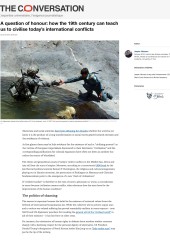A question of honour: how the 19th century can teach us to civilise today’s international conflicts
Jasper Heinzen, "A question of honour: how the 19th century can teach us to civilise today’s international conflicts", The Conversation, January 25th, 2018 [online]
Seen on January 25th, 2018, URL : https://theconversation.com/a-question-of-honour-how-the-19th-century-can-teach-us-to-civilise-todays-international-conflicts-90331
Extract
Historians and social scientists have been debating for decades whether the world as we know it is the product of a long transformation in social mores geared towards restraint and the avoidance of violence.
At first glance there may be little evidence for the existence of such a “civilising process”: as the victims of European imperialism discovered to their detriment, “civilisation” and the corresponding justifications for colonial expansion have often not been an antidote but rather the source of bloodshed.
The ethnic and geopolitical causes of today’s violent conflicts in the Middle East, Africa and Asia still bear the scars of empire. Moreover, according to a controversial 1996 book by the late Harvard political scientist Samuel P. Huntington, the religious and cultural antagonisms playing out in Islamist terrorism, the persecution of Rohingyas in Myanmar and Christian fundamentalism point to the emergence of a new “clash of civilisations”.
If “civilised warfare” is therefore in the eyes of some a pleonasm or, worse, a contradiction in terms because civilisation means conflict, what relevance does the term have for the improvement of the human condition?
|
|
|
In search of civilised war: prisoners of war and the concept of military honour in Western Europe, 1750-1918 01 September 2017 - 30 June 2018 |
|
|

